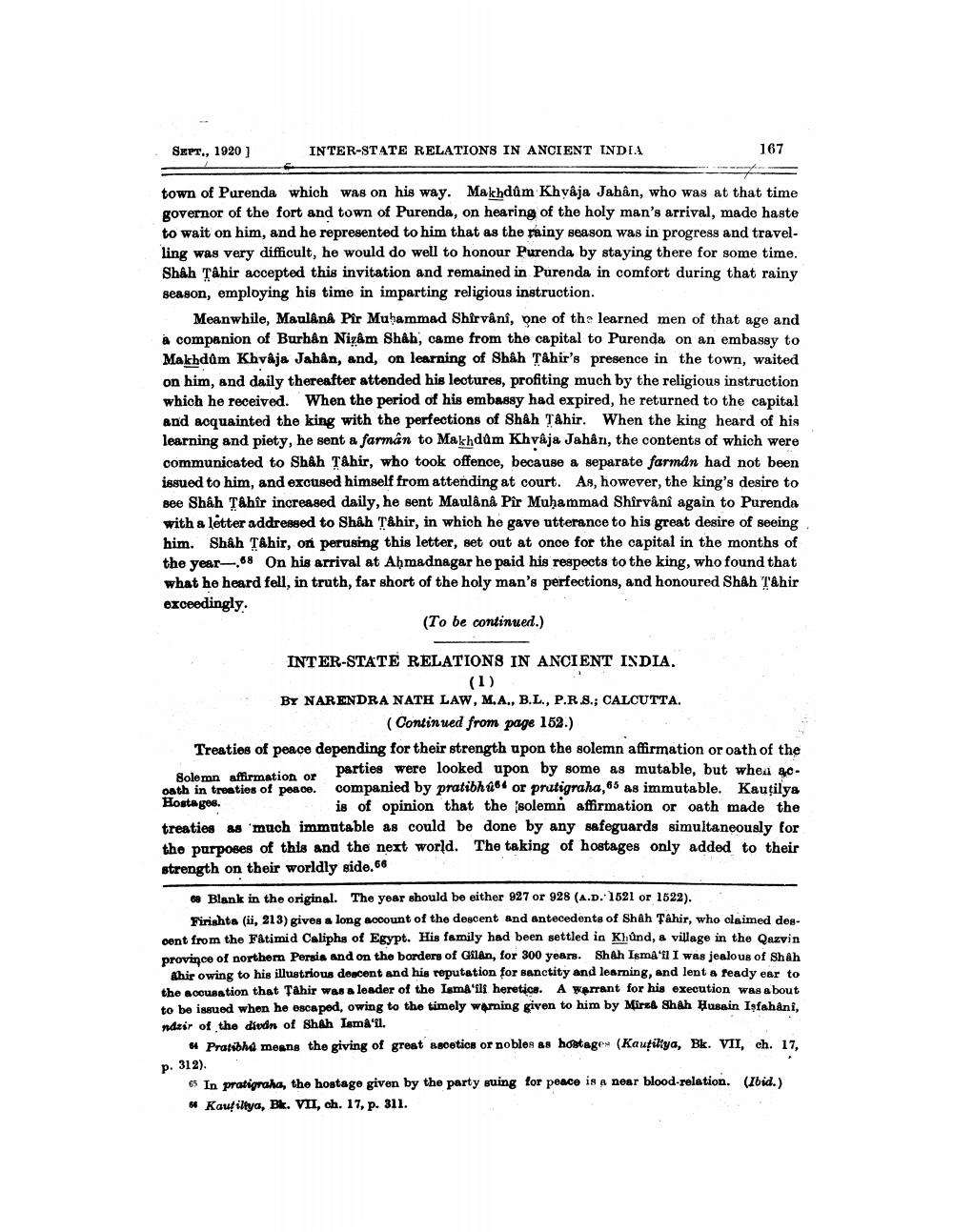________________
SEPT., 1920)
INTER-STATE RELATIONS IN ANCIENT INDIA
167
town of Purenda which was on his way. Makhdum Khwaja Jahân, who was at that time governor of the fort and town of Purenda, on hearing of the holy man's arrival, made haste to wait on him, and he represented to him that as the rainy season was in progress and travelling was very difficult, he would do well to honour Purenda by staying there for some time. Shah Tahir accepted this invitation and remained in Purenda in comfort during that rainy season, employing his time in imparting religious instruction.
Meanwhile, MaulAna Pir Muhammad Shîrvânî, one of the learned men of that age and a companion of Burhan Nizam Shah, came from the capital to Purenda on an embassy to Makhdam Khvaja Jahân, and, on learning of Shah Tahir's presence in the town, waited on him, and daily thereafter attended his lectures, profiting much by the religious instruction which he received. When the period of his embassy had expired, he returned to the capital and acquainted the king with the perfections of Shah Tâhir. When the king heard of his learning and piety, he sent a farman to Makhdům Khvâja Jahân, the contents of which were communicated to Shah Tâhir, who took offence, because a separate farmán had not been issued to him, and excused himself from attending at court. As, however, the king's desire to see Shah Tâhîr increased daily, he sent Maulânâ Pir Muhammad Shirvânî again to Purenda with a letter addressed to Shah Tâhir, in which he gave utterance to his great desire of seeing him. Shah TAhir, on perusing this letter, set out at once for the capital in the months of the year-68 On his arrival at Ahmadnagar he paid his respects to the king, who found that what he heard fell, in truth, far short of the holy man's perfections, and honoured Shah Tahir exceedingly,
(To be continued.)
INTER-STATE RELATIONS IN ANCIENT INDIA.
(1) BY NARENDRA NATH LAW, M.A., B.L., P.R.S.; CALCUTTA.
(Continued from page 152.) Treaties of peace depending for their strength upon the solemn affirmation or oath of the Solemn affirmation of parties were looked upon by some as mutable, but when ac. oath in treation of peace. companied by pratibh 464 or prutigraha, 65 as immutable. Kautilya Hostages.
is of opinion that the solemn affirmation or oath made the treaties as much immutable as could be done by any safeguards simultaneously for the purposes of this and the next world. The taking of hostages only added to their strength on their worldly side. 66
68 Blank in the original. The year should be either 927 or 928 (A.D. 1621 or 1622).
Firishta (ii, 213) gives a long account of the descent and antecedents of Shah Tahir, who claimed doscent from the Fatimid Caliphs of Egypt. His family had been settled in Khund, a village in the Qazvin province of northom Persis and on the borders of Gilan, for 300 years. Sheh Isma'il I was jealous of Shah
Ahir owing to his illustrious descent and his reputation for Banctity and learning, and lent a ready ear to the accusation that Tahir was a leader of the Isma'ilf heretice. A warrant for his execution was about to be issued when he escaped, owing to the timely warning given to him by Mir Shah Husain Isfahani, ndair of the divdn of Shah Isma'il.
* Pratibhd means the giving of great ascetics or nobles &s hostage (Kautilya, Bk. VII, ch. 17,
p. 312).
65 In pratigraha, the hostage given by the party suing for peace is a near blood-relation. (Ibid.) * Kaufiltya, Bk. VII, ch. 17, p. 311.




